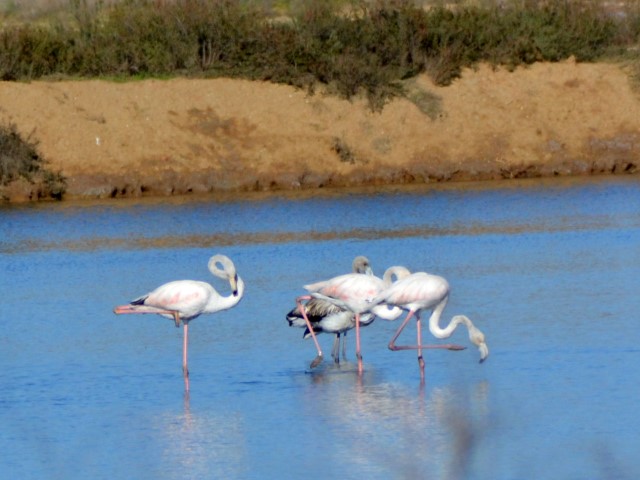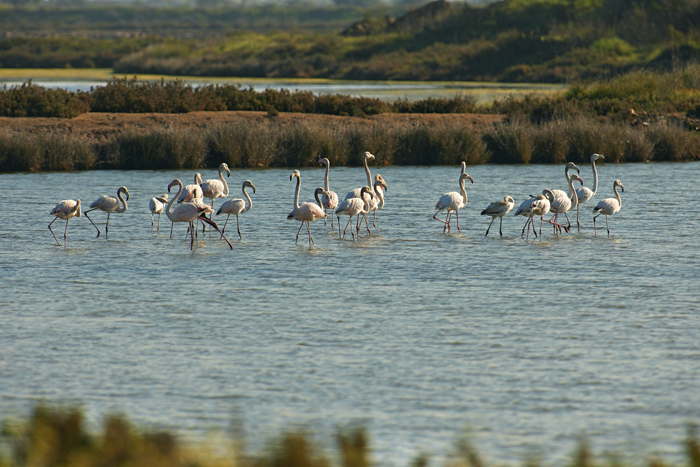There are two colonies of flamingos (Phoenicopterus roseus) nesting in Portugal for the first time, announced today the Institute for the Conservation of Nature and Forests (ICNF), to mark the International Day of Biodiversity.
ICNF recalls that, in 2010, there had already been a first nesting attempt in Portugal, but without success.
In recent years, «the population of flamingos has been increasing in Portugal, including in many wetlands where it was rarely observed before. However, despite the significant increase, this species so emblematic and sought after by so many researchers and visitors,
continued without actually nesting in Portugal», explains the ICNF.
The scientific reasons for the situation to change "are not yet known". Based on the observation made by the Nature Watchers and technicians from the ICNF's Center for the Study of Migration and Protection of Birds (CEMPA), «it is possible to see an increase in the feeding and resting areas of this species in Portugal, accompanied by a decrease in human activity due to the restrictions imposed by the COVID-19 pandemic'.
In addition to the reasons identified, it is known to the scientific community that the places where the flamingos (Phoenicopterus roseus) reproduce are feeling the effects of drought for several years.
Mixed risks, of an environmental component, are associated with potentially dangerous phenomena with combined causes, including forest fires, aquifer contamination and the consequent degradation of habitats.
Without the right ecological conditions, flamingos do not have space to reproduce, so they look for other places that allow them to feed, nest and reproduce, as in Portugal, where there are areas rich in food.
This year, and for the first time, there are two colonies of flamingos nesting in two Protected Areas under the management of the Institute for the Conservation of Nature and Forests, «where a considerable nest value is estimated in the two colonies».
Therefore, stresses the ICNF, «we are counting, very soon, on the arrival of the first juveniles born in Portuguese territory».
However, adds that Institute, “due to the sensitivity of the moment, it is important to remember the importance of not disturbing the areas.
chosen by this species to nest. The eggs will soon hatch and it will be possible to follow the growth of the small flamingos».

With the motto “We are part of the solution”, the International Day of Biodiversity (or Biological Diversity) “reminds us that biodiversity has the answer to the various challenges that sustainable development poses to us, as individuals and society”.
For, in 2050, “if we reach the goal of living in harmony with nature, we must understand that we are part of it and that it is in our hands to act to stop the loss of biodiversity, at all levels”, underlines the ICNF.
Indeed, biodiversity encompasses both the variability between living organisms and terrestrial and aquatic ecosystems and the ecological complexes of which they are part; as well as the diversity within each species, between species and ecosystems.
«It will be, and always has been, this diversity of genes, species and ecosystems that will allow us to: discover new medicines; find agricultural crops more adapted to climate change; having a more diverse and fire-resilient forest; obtain new raw materials; achieve less polluting fuels; greener and more environmentally friendly growth,” explains the ICNF.
Despite being essential to human life, biodiversity is far from being well known and understood. «Every year, new species are discovered, even in Portugal, but unfortunately, others are also extinguished that we never got to know or in what way they were and could be useful for our survival».
The COVID-19 pandemic “has reinforced the idea that we depend on nature and that, by threatening it, we also put human life at risk. Only by guaranteeing the balance of ecosystems can we ensure the survival of our species and a sustained development that allows the next generations to solve new environmental problems that arise».
Therefore, on June 5th, the United Nations Decade for the Restoration of Ecosystems will be launched, aiming to prevent, halt and reverse the degradation of ecosystems in all parts of the Earth. Only by maintaining biodiversity can we eradicate poverty, combat climate change and prevent mass extinction.
“But, in order to achieve this harmonious relationship with nature, each and every one has a role to play: researchers who make us understand how nature works so that we can better respect it; inhabitants and visitors of protected areas that maintain natural values and see their efforts rewarded; rural landowners who maintain soil biodiversity and productivity, in collaboration with insects, birds and other pests controlling beings; city dwellers who want and maintain greener spaces with native species and who understand their dependence on natural environments; tourists who demand more diverse landscapes and closer and more nature-friendly tourism; greener, more efficient and less polluting industries; consumers who choose products obtained with less impact on the natural environment», says the ICNF.
«In nature, everything is interconnected and each one of us depends on it. Oxygen, water, food, medicine, raw materials, oil, coal, the ozone layer, all of this is given to us by biodiversity».
Therefore, not only on May 22nd, but every day, "we must become aware and act so that our actions contribute to maintaining biological diversity, the basis of human existence."




















Comments